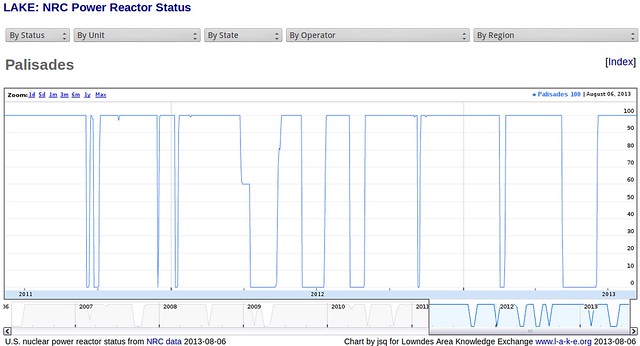Decrepit nuke leaked radioactive water into Lake Michigan
in May 2013, and “The same tank sprang a leak in 2012.”
That reactor has been down so many times the reporter couldn’t count
them all.
 When will we realize what Korea and now Japan has:
the nuclear industry colludes to hide its mistakes from the public,
and the public needs to do something about it.
When will we realize what Korea and now Japan has:
the nuclear industry colludes to hide its mistakes from the public,
and the public needs to do something about it.
David N. Goodman wrote for AP 6 May 2013, Nuclear Regulatory Commission: ‘Very slightly radioactive water’ enters Lake Michigan,
Nope, ten times; count ’em:Early Sunday morning, the tank was ruled inoperable and the nuclear power plant began powering down. This is reportedly the ninth time that the facility has been shut down since 2011.
And it stayed down from May 6th to June 17th 2013. Plus who knows what it’s leaking now that they didn’t bother to take it down for?
The public can generally count on the NRC’s risk assessments and its willingness to get tough with operators of nuclear plants that have recurring problems, said Alan Jackson, a radiation health physicist at Henry Ford Health System in Detroit.
Yeah, that’s what Californians counted on about San Onofre, only to discover NRC wouldn’t even show the public Southern California Edison’s documents that were their excuse for trying to restart it because “it’s never been a practice” to show licensing documents to the public for any reactor. San Onofre is shut down because of non-governmental activists with a little help from the California Public Utilities Commission.
 The Japanese people depended on their nuclear officials to oversee
TEPCO about Fukushima, but that didn’t happen for two years
while Fukushima leaked into the air and the ocean
and it continues to do so.
The Japanese people depended on their nuclear officials to oversee
TEPCO about Fukushima, but that didn’t happen for two years
while Fukushima leaked into the air and the ocean
and it continues to do so.
Meanwhile, stateside, the EPA wants to raise radiation limits even after tuna have been caught off California with radioactive isotopes from Fukushima.
What should be of concern to regulators and the public, Jackson said, is whether any nuclear power plant has enough of a culture of safety in place. That’s especially important because of the intense pressures in the electrical power industry to keep costs low.
 The Korean government is finally concerned about
the Korean nuclear mafia of power companies, vendors, and testers.
Maybe we should get concerned about that, too, and not just in Korea or Japan.
Will we wait until the Savannah River is more radioactive than it already is?
Will we wait until the Altamaha River is radioactive and the Floridan Aquifer
is contaminated?
Will we let Southern Company suck up more resources for those new nukes
that could go to building wind offshore and solar inland?
Or will we do something about it?
The Korean government is finally concerned about
the Korean nuclear mafia of power companies, vendors, and testers.
Maybe we should get concerned about that, too, and not just in Korea or Japan.
Will we wait until the Savannah River is more radioactive than it already is?
Will we wait until the Altamaha River is radioactive and the Floridan Aquifer
is contaminated?
Will we let Southern Company suck up more resources for those new nukes
that could go to building wind offshore and solar inland?
Or will we do something about it?
-jsq
Short Link:
